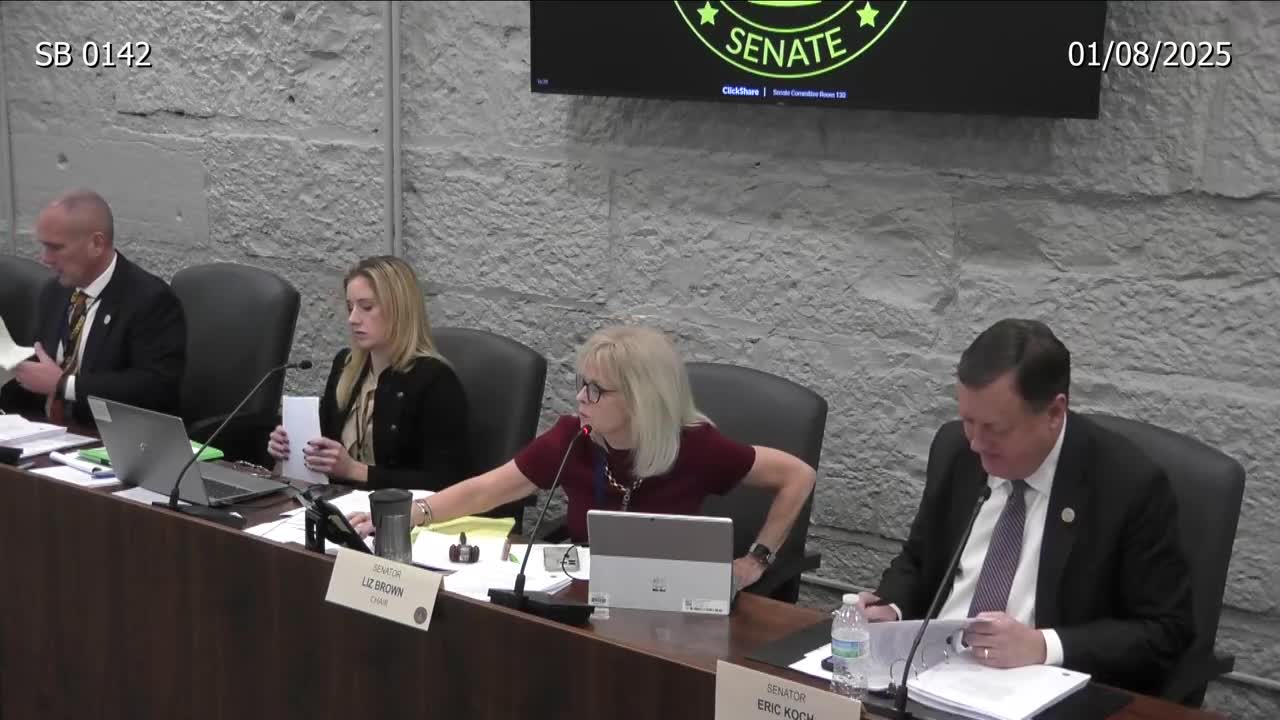Committee hears wide support for automatic eviction‑sealing changes; technical issues flagged

Summary
Senate Bill 142 would broaden and automate sealing of qualifying eviction records. Legal aid, law‑school clinics, United Ways, AARP and housing advocates supported the measure; the title and mortgage industry raised technical chain‑of‑title concerns that sponsors said they will address in amendments.
Senate Bill 142, a proposal to expand and automate the sealing of qualifying eviction cases, received broad bipartisan and stakeholder support in testimony before the Senate Judiciary Committee. Advocates described the bill as a practical tool to reduce long‑term housing instability; title and bar representatives flagged chain‑of‑title concerns that they said would require technical fixes.
What the bill would change: Under current law (HEA 1214, 2022), eviction sealing requires a tenant to file a petition in many circumstances. SB 142 would require courts to issue sealing orders automatically in specified qualifying situations (for example, dismissals, tenant wins, or judgments satisfied) and would expand the time window after which eviction records are sealed — the draft discussed a seven‑year period. Supporters said automatic sealing would prevent erroneous public reporting and ease housing transitions.
Supporters’ testimony: David Pruitt, director of Notre Dame Law School’s eviction clinic, said the proposal would encourage settlements and avoid penalizing tenants who prevailed or paid judgments. Indiana Legal Services reported it had opened clinics and helped more than 1,600 eviction sealing petitions last year; its attorney Jenny Terry urged automatic seals to avoid procedural barriers for low‑income tenants. United Ways, AARP, and Prosperity Indiana also testified, linking evictions to homelessness, child health and long‑term economic harms. Several witnesses offered shorter alternative timelines (the Notre Dame report recommended three years) and urged measures to ensure sealed records are removed from commercial tenant‑screening databases.
Industry and technical concerns: Title industry and probate‑trust bar representatives cautioned that sealing records raises chain‑of‑title and judgment‑lien issues. Elizabeth Berg of the Indiana Land Title Association and the ISBA’s Probate, Trust and Real Property section said unpaid monetary judgments still create liens that can attach to later‑acquired real property; she proposed technical language to ensure a sealed eviction does not inadvertently prevent lenders, title companies or judgment creditors from discovering enforceable debts. Committee members and witnesses discussed whether sealing should extinguish judgment liens (industry said no) or require a separate carve‑out so creditors can pursue collection while public access to records is limited. Senator Brown said staff will work on technical drafting to reconcile sealing with judgment‑lien and title search needs.
Procedure and next steps: Chair Brown said the committee will hold SB 142 for amendment while staff and stakeholders reconcile chain‑of‑title and judgment‑collection mechanics; she signaled a willingness to refine the seven‑year period and ensure courts can automate sealing for qualifying cases without impairing creditors’ statutory remedies. The committee did not take a vote on the bill during the hearing.
Why it matters: Advocates said automatic sealing reduces barriers to housing and employment for people who prevailed in eviction court or satisfied judgments. Industry witnesses urged careful drafting so sealing does not create latent title defects or unexpected liabilities when former tenants later acquire real property.
Source excerpts: Testimony from Notre Dame’s eviction clinic, Indiana Legal Services, United Ways, AARP, Prosperity Indiana, and the Indiana Land Title Association was recorded on the hearing record.

